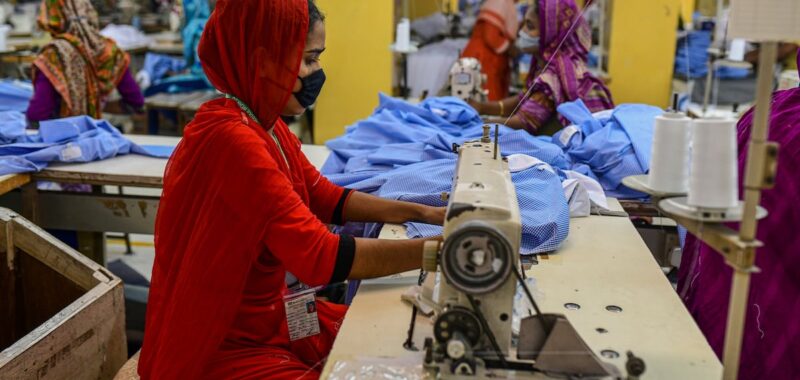
Bangladeshi garment exporter Shahidullah Azim woke up on Thursday to the shock of US President Donald Trump slapping a 37 percent tariff on his countryâs exports, endangering an apparel hub already reeling from domestic political upheaval.
âWe knew something was coming, but we never expected it to be this drastic … This is terrible for our business and for thousands of workers,â said Azim, whose clients include North American and European retailers.
Suppliers in Bangladeshâs garment industry, which counts Gap Inc and Vans parent VF Corp as clients, told Reuters they began seeking government support hours after Trumpâs lightning bolt.
Some companies in the impoverished South Asian country are pressing government officials to negotiate further on tariffs with the U.S. to prevent foreign buyers bolting to save costs.
The readymade garments industry is of existential importance to Bangladeshâs economy, accounting for more than 80 percent of total export earnings, employing 4 million people and contributing roughly 10 percent to its annual GDP.
Trumpâs global tariff barrage deals the latest and heaviest blow to the industry.
Last year, garment production was disrupted by violent protests that ousted Prime Minister Sheikh Hasina in August, casting doubt on the long-term potential of a market much sought after by Western fashion brands.
Azim said his company, which employs 3,200 factory workers, was bracing for order cancellations as rising costs for buyers could spell the end of Bangladeshâs competitive edge.
A representative of the Bangladesh Knitwear Manufacturers and Exporters Association, which supports more than 2,500 factories, told Reuters that it approached the government on Thursday seeking support against the tariff blow, and officials said the issue was being considered seriously.
Shafiqul Alam, the interim governmentâs press secretary, said in a statement that the United States was a âclose friendâ and Bangladeshâs largest export destination. He said Dhaka has been working with Washington on trade matters, and expects those discussions will âhelp address the tariff issue.â
Advantage for India?
Bangladeshâs loss is neighbour Indiaâs gain in some ways.
Anwar-ul-Alam Chowdhury of garment maker Evince fears India, which had been getting more queries from US suppliers since last yearâs political crisis in Bangladesh, will now benefit even more as it faces a lower Trump tariff of 27 percent.
The Evince Group website says it has Tommy Hilfiger and Levi Strauss & Co as clients, and deals in woven shirts, denim and yarns.
âBangladesh will be among the hardest hit,â said Chowdhury.
While India contributes only 6-7 percent of US garment imports, far behind Bangladesh and Vietnam, the top 30 US apparel brands indicated a shift in preference towards India from Bangladesh due to the latterâs political crisis last year, a survey by the United States Fashion Industry Association showed.
Another major South Asian casualty of Trumpâs âreciprocal tariffâ move is Sri Lanka, which now faces a 44 percent tariff.
Around 40 percent of Sri Lankaâs apparel exports are to the United States, which helped the island nation earn $1.9 billion last year. Apparel is also Sri Lankaâs second largest foreign exchange earner; the sector employs 300,000 people.
Sri Lankan President Anura Kumara Dissanayakeâs office said in a statement that a panel of government officials and apparel companies has been formed to study âpotential issuesâ that could arise from the new tariffs.
âSri Lanka could very quickly see its share of U.S. business move to countries with lower tariffs,â said Yohan Lawrence, Secretary General of Sri Lankaâs Joint Apparel Association Forum. âThis situation is serious, and it must be addressed as a matter of national urgency.â
By Dhwani Pandya, Uditha Jayasinghe, Ruma Paul, Aditya Kalra and Mark Heinrich
Learn more:
Trumpâs Tariffs Rock Fashionâs Supply Chain
Some of the most severe import duties announced Wednesday were aimed at apparel manufacturing hubs.

